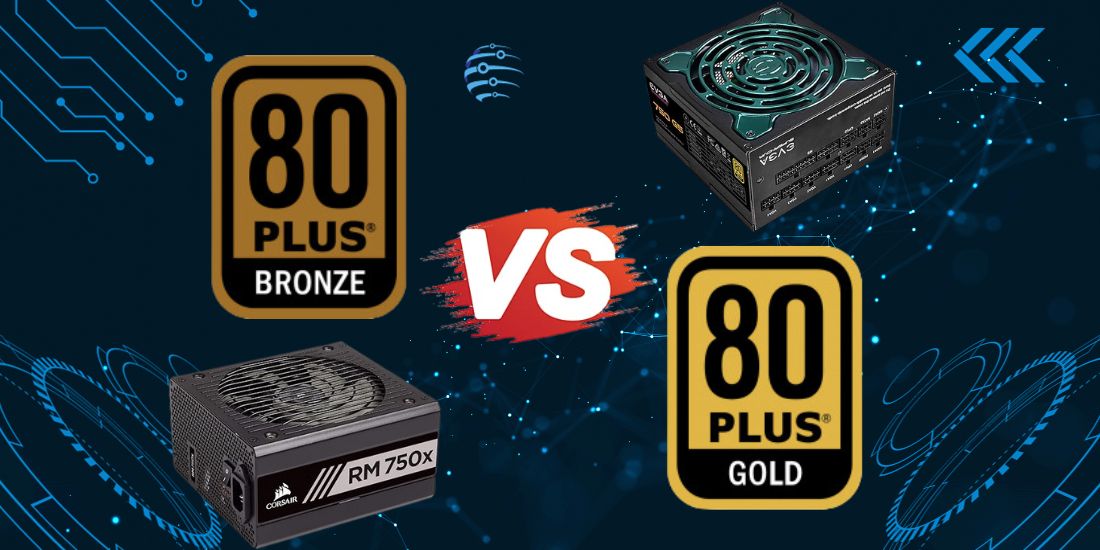Bronze vs Gold PSUs – Making the Right Choice for Your System
When building or upgrading a computer, selecting the right power supply unit (PSU) is a critical decision. The PSU is the backbone of your system, ensuring stable and reliable power delivery to all components. Among the factors to consider, the PSU’s efficiency rating often takes center stage. Two common efficiency ratings you’ll encounter are 80 Plus Bronze and 80 Plus Gold.
But what do these ratings mean, and how do they impact performance, energy consumption, and cost? Bronze PSUs are known for their affordability and decent efficiency, while Gold PSUs promise higher energy efficiency and better performance—but usually at a higher price. Understanding the differences between these two categories is crucial to making an informed choice that aligns with your budget and system requirements. In this guide, we’ll explore the pros and cons of Bronze vs Gold PSUs, and use cases to help you decide which one is the better fit for your setup.
Understanding PSU Certifications:
Power supply unit (PSU) certifications play a vital role in determining the efficiency and reliability of a PSU. The most widely recognized standard is the 80 Plus certification, which indicates a PSU’s ability to convert power from the wall outlet into usable energy efficiently, minimizing energy loss as heat.
The 80 Plus certification includes several tiers: Standard, Bronze, Silver, Gold, Platinum, and Titanium. Each tier signifies a higher level of efficiency under specific load conditions, with Bronze being the entry-level for decent performance and Titanium representing the highest efficiency. For example, a Bronze PSU must be at least 82% efficient at 20% load, while a Gold PSU must reach 87% efficiency at the same load. These certifications are important because they impact energy consumption, heat output, and overall system stability. Choosing the right certification depends on your budget, energy efficiency goals, and system requirements.
Bronze PSUs:
Bronze-rated PSUs are a popular choice for budget-conscious PC builders seeking reliable performance without overspending. As part of the 80 Plus certification tier, Bronze PSUs deliver at least 82% efficiency at 20% load, 85% at 50% load, and 82% at full load. This means they waste less energy as heat than non-certified or lower-tier models, offering decent efficiency for everyday use. While not as efficient as Gold or Platinum-rated units, Bronze PSUs balance affordability and performance, making them ideal for mid-range gaming systems or office setups that don’t require extreme power efficiency.
ASUS TUF GAMING 550W
Power Spec 650W
Advantages of Bronze PSUs:
1: Affordability: Bronze PSUs are cost-effective, making them an excellent choice for budget-conscious users building mid-range PCs.
2: Energy Efficiency: With an 80 Plus Bronze certification, these PSUs offer at least 82% efficiency at 20% and full load, and 85% at 50% load, reducing energy waste compared to non-certified units.
3: Reliable Performance: Bronze-rated PSUs provide stable and consistent power, ensuring sufficient reliability for most gaming, productivity, and office setups.
4: Lower Heat Output: Increased efficiency means less energy is lost as heat, leading to cooler operation compared to non-certified power supplies.
5: Wide Availability: Due to their popularity, Bronze PSUs are readily available in various wattages, ensuring compatibility with many PC builds.
6: Good Value for Money: They strike a balance between cost and performance, offering a reliable solution for those who don’t require premium efficiency.
Gold PSUs:
Gold-rated PSUs are a step above Bronze models, offering greater energy efficiency and improved performance. As part of the 80 Plus certification, they deliver at least 87% efficiency at 20% load, 90% at 50% load, and 87% at full load, resulting in less energy waste and reduced electricity costs. While they are typically more expensive than Bronze PSUs, Gold units produce less heat, operate more quietly, and often feature higher-quality components for enhanced reliability and longevity. These attributes make them ideal for gaming PCs, workstations, or systems that run continuously and demand both efficiency and stability.
Corsair RM850x
CORSAIR RM750
Advantages of Gold PSUs:
1: Higher Energy Efficiency: Gold-rated PSUs provide at least 87% efficiency at 20% and full load, and 90% at 50% load, reducing energy waste and lowering electricity bills.
2: Lower Heat Output: With less energy lost as heat, Gold PSUs run cooler, contributing to better overall system thermals and longevity.
3: Enhanced Reliability: Often built with higher-quality components, Gold PSUs ensure stable power delivery, making them ideal for high-performance or critical systems.
4: Quieter Operation: Improved efficiency and lower heat output often mean quieter fan speeds and noise levels during operation.
5: Longevity: The robust build quality of Gold PSUs enhances their durability, ensuring reliable performance over the long term.
6: Better Value for Power-Intensive Builds: While more expensive upfront, their efficiency and reliability make them a cost-effective choice for gaming rigs, workstations, or continuous-use systems.
Comparative Analysis Between Bronze vs Gold PSUs:
1. Efficiency and Energy Savings:
- Bronze PSU: While Bronze PSUs offer decent efficiency, they are not as power-efficient as Gold-certified models. Over the long term, the energy savings with a Gold PSU can offset the initial higher cost.
- Gold PSU: Gold-certified PSUs are more energy-efficient, especially when operating at medium to high loads. The reduced energy consumption can result in lower electricity bills, making Gold PSUs a cost-effective choice in the long run.
2. Price Point:
- Bronze PSU: Bronze-certified power supplies are generally more affordable than their Gold counterparts. This makes them an attractive option for users on a tight budget or those building entry-level systems.
- Gold PSU: Gold PSUs come with a higher price tag due to their increased efficiency and performance. However, the initial investment can be justified by the long-term energy savings and the benefits they bring to high-performance systems.
3. System Compatibility:
- Bronze PSU: Bronze-certified power supplies are suitable for a wide range of systems, particularly those with moderate power requirements. They are ideal for users who prioritize budget considerations without compromising on reliability.
- Gold PSU: Gold PSUs are better suited for high-performance systems that demand a consistent and efficient power supply. Gamers, content creators, and professionals who rely on powerful hardware can benefit from the stability and efficiency offered by Gold-certified units.
Choosing the Right PSU for Your Needs:
When deciding between a Bronze vs Gold PSUs, consider the following factors to ensure that your choice aligns with your system requirements:
- System Power Requirements:
- Assess the power demands of your components, including the CPU, GPU, and other peripherals. High-end gaming PCs or content creation workstations may benefit from the higher efficiency and stability of a Gold PSU.
- Budget Constraints:
- Determine your budget for the power supply. If you are building a budget-friendly system or have limited funds, a Bronze PSU may be the more practical choice.
- Long-Term Savings:
- If you plan to use your system for an extended period, consider the long-term energy savings offered by a Gold PSU. While the initial cost may be higher, the efficiency gains can result in significant savings on your electricity bills over time.
- Future Upgrades:
- If you anticipate future upgrades to your system, especially the addition of power-hungry components, investing in a Gold PSU ensures that your power supply can handle increased demands without sacrificing efficiency.
- Reliability and Performance:
- For users who prioritize system reliability and performance, a Gold PSU provides a stable power supply, reducing the risk of component failure and ensuring optimal performance, especially under heavy workloads.
Conclusion
When deciding between Bronze and Gold PSUs, your choice should depend on your budget, system requirements, and long-term goals. Bronze PSUs offer a cost-effective solution with decent efficiency and reliable performance, making them ideal for budget builds or mid-range systems that don’t demand extreme power efficiency.
On the other hand, Gold PSUs provide higher energy efficiency, better reliability, and quieter operation. While they come at a higher upfront cost, their reduced energy waste and long-term durability make them a smart investment for high-performance gaming PCs, workstations, or systems that run continuously. Both Bronze and Gold PSUs have their strengths, and the right choice depends on balancing performance needs with affordability. For casual users, Bronze PSUs deliver reliable results, while power-intensive users and enthusiasts will benefit more from the superior efficiency and longevity of Gold-rated units.
FAQs
a. What is PSU certification, and why does it matter?
PSU certification indicates energy efficiency. Bronze vs Gold PSUs ratings help choose a power supply. Gold is more efficient, leading to long-term energy savings.
b. How can I determine my power supply’s wattage?
Check the label or manufacturer documentation, use system information tools in Windows, or employ third-party software like CPU-Z.
c. What are the advantages of Bronze PSU over Gold?
Bronze PSUs are more budget-friendly, making them ideal for entry-level systems with moderate power demands.
d. Why choose a Gold PSU?
Gold PSUs offer higher efficiency, making them suitable for high-performance systems and providing long-term energy savings.
e. What factors should I consider when choosing between Bronze and Gold PSUs?
Consider your budget, system power requirements, long-term energy savings, future upgrades, and the reliability/performance needs of your system.
Last Updated on 24 January 2025 by Ansa Imran

Ansa Imran, a writer, excels in creating insightful content about technology and gaming. Her articles, known for their clarity and depth, help demystify complex tech topics for a broad audience. Ansa’s work showcases her passion for the latest tech trends and her ability to engage readers with informative, well-researched pieces.











